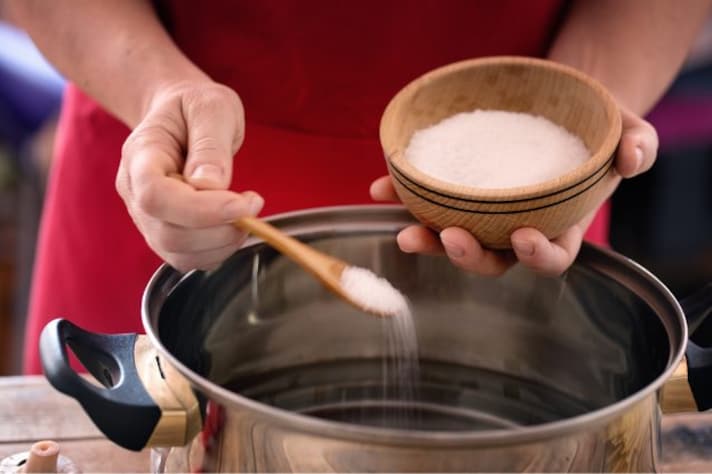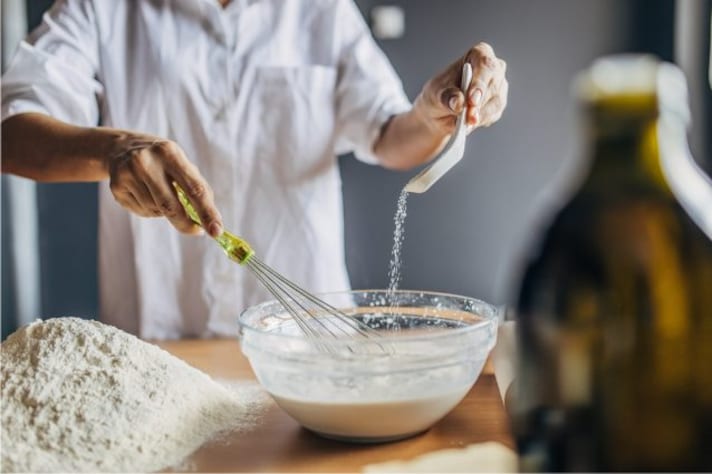Can You Salt And Season Your Dishes With Your Hands? And Should You?
Handling salt with our hands when we are cooking - especially if we are dealing with raw ingredients - could come with a couple of risks. First of all, we could risk cross-contaminating both the salt and the various ingredients; then, we could also contaminate the salt cellar itself, risking to give bacteria a place to harbor and develop. When handling salt with your hands, and seasoning to taste, make sure to frequently wash your hands and dry them properly.

When we cook, especially frequently, it's essential to have all ingredients readily available. Among these, salt stands out as a crucial component, often stored in a salt cellar within the pantry for easy access. This setup ensures that whenever we need to season our dishes, salt is always within reach. However, this convenience brings forth an important question: what's the best way to measure and season with salt? Is it safe to use your fingers, or is it better to rely on measuring spoons?
What Happens If You Touch Salt With Dirty Hands?
One of the primary concerns with pinching salt with our fingers is the risk of cross-contamination. When we handle various ingredients, especially raw meats and vegetables, our hands can transfer bacteria and other pathogens. Studies have shown that bacteria like Salmonella and E. coli can easily spread through improper handling and hygiene practices in the kitchen. Professors of food safety, such as Dr. Benjamin Chapman from North Carolina State University, emphasize the importance of minimizing direct hand contact with foods and ingredients to reduce these risks. Therefore, touching salt with potentially contaminated hands can lead to the inadvertent spread of harmful microbes.

Even Your Salt Cellar Can Get Contaminated
Beyond the immediate risk of cross-contamination, there is also the issue of contaminating the salt cellar itself. When we reach into the salt cellar with dirty hands, we can introduce bacteria and other contaminants into the salt. Over time, these contaminants can build up, creating a reservoir of potential pathogens. This not only compromises the salt's purity but also poses a health risk each time we use it. Food safety experts suggest that repeated contact with the same container can significantly increase the likelihood of spreading bacteria, highlighting the need for caution.
Is Salt Self-Cleaning?
A common misconception is that salt, due to its preservative properties, is self-cleaning and can kill bacteria. While it's true that salt can inhibit the growth of certain bacteria by drawing out moisture through osmosis, it is not effective against all pathogens. Some bacteria can survive in high-salt environments, and the process of reaching into a salt cellar with dirty hands can still transfer these microbes. Therefore, relying on salt's natural properties for sanitation is not a foolproof method, and proper hygiene practices are still necessary.

How to Handle Salt To Minimize the Risks
When a recipe requires precise amounts of salt, it's best to rely on measuring cups and spoons (such as tbsp and tsp), both to ensure accuracy and to avoid direct contact that could pose a risk. When salt doses are not precisely given, but you're seasoning to taste, ensure that your hands are thoroughly washed and dried before you handle the salt. To avoid contaminating the salt cellar, take a small dose of salt and store it in a little pinch bowl that you'll handle throughout the entire recipe process. When you handle raw ingredients, make sure to wash your hands frequently and clean and sanitize the salt cellar regularly.
;Resize,width=767;)
;Resize,width=712;)


